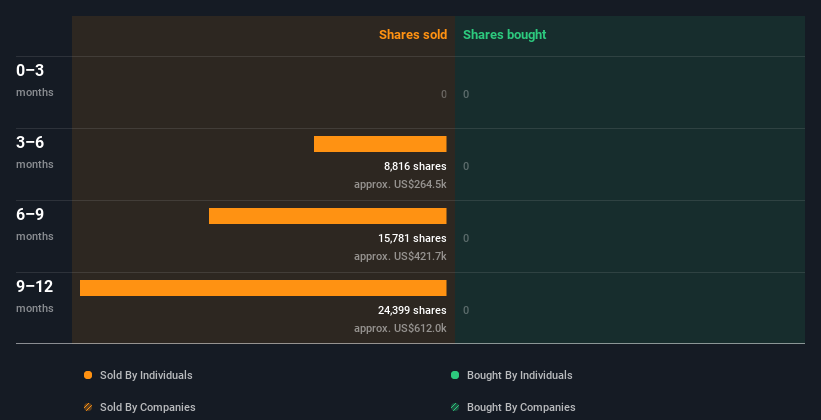- United States
- /
- Machinery
- /
- NYSE:TRN
Trinity Industries Insiders Sold US$1.3m Of Shares Suggesting Hesitancy

Trinity Industries, Inc. (NYSE:TRN) shareholders may have reason to be concerned, as several insiders sold their shares over the past year. Knowing whether insiders are buying is usually more helpful when evaluating insider transactions, as insider selling can have various explanations. However, when multiple insiders sell stock over a specific duration, shareholders should take notice as that could possibly be a red flag.
While we would never suggest that investors should base their decisions solely on what the directors of a company have been doing, logic dictates you should pay some attention to whether insiders are buying or selling shares.
View our latest analysis for Trinity Industries
The Last 12 Months Of Insider Transactions At Trinity Industries
Over the last year, we can see that the biggest insider sale was by the Executive VP & CFO, Eric Marchetto, for US$320k worth of shares, at about US$27.00 per share. So it's clear an insider wanted to take some cash off the table, even below the current price of US$35.44. As a general rule we consider it to be discouraging when insiders are selling below the current price, because it suggests they were happy with a lower valuation. However, while insider selling is sometimes discouraging, it's only a weak signal. It is worth noting that this sale was only 4.5% of Eric Marchetto's holding.
In the last year Trinity Industries insiders didn't buy any company stock. You can see the insider transactions (by companies and individuals) over the last year depicted in the chart below. If you want to know exactly who sold, for how much, and when, simply click on the graph below!

If you are like me, then you will not want to miss this free list of small cap stocks that are not only being bought by insiders but also have attractive valuations.
Does Trinity Industries Boast High Insider Ownership?
Another way to test the alignment between the leaders of a company and other shareholders is to look at how many shares they own. I reckon it's a good sign if insiders own a significant number of shares in the company. Insiders own 1.5% of Trinity Industries shares, worth about US$43m. This level of insider ownership is good but just short of being particularly stand-out. It certainly does suggest a reasonable degree of alignment.
So What Does This Data Suggest About Trinity Industries Insiders?
It doesn't really mean much that no insider has traded Trinity Industries shares in the last quarter. Our analysis of Trinity Industries insider transactions leaves us cautious. But it's good to see that insiders own shares in the company. While it's good to be aware of what's going on with the insider's ownership and transactions, we make sure to also consider what risks are facing a stock before making any investment decision. At Simply Wall St, we've found that Trinity Industries has 3 warning signs (1 is concerning!) that deserve your attention before going any further with your analysis.
But note: Trinity Industries may not be the best stock to buy. So take a peek at this free list of interesting companies with high ROE and low debt.
For the purposes of this article, insiders are those individuals who report their transactions to the relevant regulatory body. We currently account for open market transactions and private dispositions of direct interests only, but not derivative transactions or indirect interests.
Valuation is complex, but we're here to simplify it.
Discover if Trinity Industries might be undervalued or overvalued with our detailed analysis, featuring fair value estimates, potential risks, dividends, insider trades, and its financial condition.
Access Free AnalysisHave feedback on this article? Concerned about the content? Get in touch with us directly. Alternatively, email editorial-team (at) simplywallst.com.
This article by Simply Wall St is general in nature. We provide commentary based on historical data and analyst forecasts only using an unbiased methodology and our articles are not intended to be financial advice. It does not constitute a recommendation to buy or sell any stock, and does not take account of your objectives, or your financial situation. We aim to bring you long-term focused analysis driven by fundamental data. Note that our analysis may not factor in the latest price-sensitive company announcements or qualitative material. Simply Wall St has no position in any stocks mentioned.
About NYSE:TRN
Trinity Industries
Provides rail transportation products and services under the TrinityRail name in North America.
Good value with proven track record and pays a dividend.

